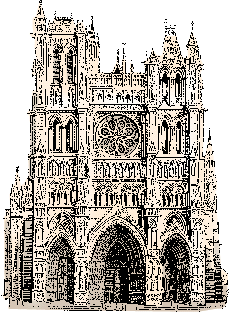Illustration of facade

- facade 1
A Brief History of Facade
Facade is thought to have come to English from the Vulgar Latin facia, meaning “face.�? Along the way it passed through both Italian, as faccia, and French, as façade. The earliest meaning of the word in English was in reference to the front portion of a building, its “face,�? so to speak (and face itself is sometimes used to describe this part of a structure as well). Somewhere along the way facade took on a figurative sense, referring to a way of behaving or appearing that gives other people a false idea of your true feelings or situation. This is similar to the figurative use of veneer, which originally had the simple meaning of a thin layer of wood that was used to cover something, and now may also refer to a sort of deceptive behavior that masks one’s actual feelings (as in, “he had a thin veneer of politeness�?).
 Terry McMillan, Waiting to Exhale, 1992
When I watched him in motion picture roles after the war, I knew there was something of honest substance behind that acting façade.
—
Terry McMillan, Waiting to Exhale, 1992
When I watched him in motion picture roles after the war, I knew there was something of honest substance behind that acting façade.
— Andrew A. Rooney, And More by Andy Rooney, (1979) 1982
… but his magic power of concentration was gone. All the façades he built up between himself and his desperate love never entirely hid it.
—
Andrew A. Rooney, And More by Andy Rooney, (1979) 1982
… but his magic power of concentration was gone. All the façades he built up between himself and his desperate love never entirely hid it.
— May Sarton, Shadow of a Man, 1950
the facade of the bank
the windowless façade of the skyscraper
They were trying to preserve the facade of a happy marriage.
I could sense the hostility lurking behind her polite facade.
May Sarton, Shadow of a Man, 1950
the facade of the bank
the windowless façade of the skyscraper
They were trying to preserve the facade of a happy marriage.
I could sense the hostility lurking behind her polite facade.
 Hannah Malach, WWD, 4 Feb. 2025
Step through the red-brick facade any morning of the week for a coffee and a nosh—and don’t miss out on the latkes served with applesauce and sour cream or the matzo ball soup.
—
Hannah Malach, WWD, 4 Feb. 2025
Step through the red-brick facade any morning of the week for a coffee and a nosh—and don’t miss out on the latkes served with applesauce and sour cream or the matzo ball soup.
— Eliseé Browchuk, Vogue, 3 Feb. 2025
Beyond the pale yellow facade and past the ground-level entrance hall is the double reception room on the second floor where Bonaparte was hosted throughout the 1840s and 50s, as well as other notable guests like Prime Minister Benjamin Disraeli.
—
Eliseé Browchuk, Vogue, 3 Feb. 2025
Beyond the pale yellow facade and past the ground-level entrance hall is the double reception room on the second floor where Bonaparte was hosted throughout the 1840s and 50s, as well as other notable guests like Prime Minister Benjamin Disraeli.
— Demetrius Simms, Robb Report, 31 Jan. 2025
Inside the ochre-and-brick facade, guests can dine alfresco to the sounds of classical guitar, while a small spa and stables set the scene for on-site activities.
—
Demetrius Simms, Robb Report, 31 Jan. 2025
Inside the ochre-and-brick facade, guests can dine alfresco to the sounds of classical guitar, while a small spa and stables set the scene for on-site activities.
— Meagan Drillinger, AFAR Media, 31 Jan. 2025
See all Example Sentences for facade
Meagan Drillinger, AFAR Media, 31 Jan. 2025
See all Example Sentences for facade 

borrowed from French, going back to Middle French fassade, borrowed from Italian facciata, from faccia "face" (going back to Vulgar Latin *facia) + -ata -ade — more at face entry 1
circa 1656, in the meaning defined at sense 1
“Facade.” Merriam-Webster.com Dictionary, Merriam-Webster, https://www.merriam-webster.com/dictionary/facade. Accessed 12 Feb. 2025.
facade
nounNglish: Translation of facade for Spanish Speakers
Britannica English: Translation of facade for Arabic Speakers
Britannica.com: Encyclopedia article about facade




Share